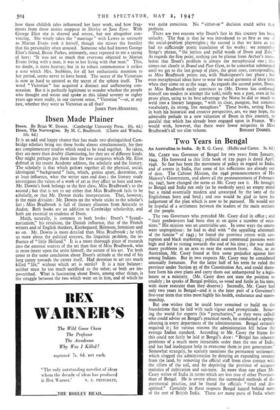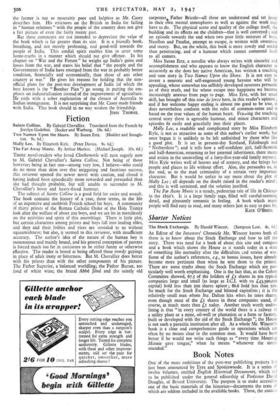Two Years in Bengal
An Australian in India. By R. G. Casey. (Hollis'and Carter. 3s. 6d.)
MR. CASEY was Governor of Bengal for two years from January, 1944. His foreword to this little book of 12o pages is dated April, 1946. So fast has been the movement of policy in regard to India, and of events in India, that some of his reflections are already out of date. The Cabinet Mission, the 1946 pronouncements of His Majesty's Government, and above all the pronouncement of February 20, 1947, have changed the scene as Mr. Casey saw it. He brought to Bengal and India not only (as he modestly says) an empty mind but a mind essentially modem and unwarped by the bent of the Englishman born and bred ; and one would be glad to have his judgement of the plan which is now to be pursued. He would not be hopeful of a settlement between the leaders of the main sections of the people.
The two Governors who preceded Mr. Casey died in office ; and " their predecessors had been shot at on quite a number of occa- sions." His mission was an unenviable one. In some ways the omens were unpropitious : he had to deal with " the appalling aftermath of the famine " of 1943 ; he found the province rotten with cor- ruption and black marketing ; political and communal passions were high and led to rioting towards the end of his time ; the war made many problems in an area so near the eastern front. Also, as an Australian, Mr. Casey found at first some prejudice against him among Indians. But in two respects Mr. Casey may be considered unusually fortunate. For the latter half of his term he ruled the province under Section 93 of the Constitution Act, and could there- fore form his own plans and carry them out unhampered by a legis- lature or a ministry. (Mr. Casey does not state the position so crudely ; he speaks of Bengal politics, so venal and futile in his time, with more restraint than they deserve.) Secondly, Mr. Casey had only two years in Bengal—and it is the later part of a Governor's five-year term that tries most highly his health, endurance and states- manship.
But one wishes that he could have remained to build on the foundations that he laid with such vigour and promptitude. Scour- ing the world for experts (his " parachutists," as they were called) -who could advise on Bengal's practical needs, he conducted a spring- cleaning in every department of the administration. Bengal certainly required it ; for various reasons the administration fell below the average Indian standard. According to Mr. Casey the blame for this could not fairly be laid at Bengal's door : " Bengal has inherent problems of a much more intractable order than the rest of India, and has had inadequate help to overcome them in past generations." Somewhat strangely, he scarcely mentions the permanent settlement, which clogged the administration by denying an expanding revenue from the land, by removing the official staff from close contact with the tillers of the soil, and by depriving the province of accurate statistics of cultivation and out-turn. In more than one place Mr. Casey writes of India in terms which are less true of other Provinces than of Bengal. He is severe about the outmoded methods of de- partmental practice, and he found the officials " tired and dis- spirited." Certainly in these respects Bengal lagged behind most of the rest of British India. There are many parts of India where the farmer is not so miserably poor and helpless as Mr. Casey describes him. His strictures on the British in India for failing in " human relations " with the people of the country does not give a fair picture of even the fairly recent past. -
But these comments are not intended to depreciate the value of the book which is far greater than its size. It is a friendly book, breathing, and not merely professing, real good-will towards the people of India. This cordial spirit enables him to utter some home-truths in a manner which should not give offence. In his chapter on " War and the Future " he weighs up India's gains and losses from the war, and states his belief that "the people and the Governments of India have emerged from the war in probably better condition, financially and economically, than those of any other country at war." He gives his reasons for holding that the non- official plans for the post-war development of India (of which the best known is the " Bombay Plan ") go wrong in putting the em- phasis on industrialisation instead of the improvement of agriculture. He ends with a sober explanation of the closure of Australia to Indian immigration. It is not surprising that Mr. Casey made friends with India. This book should in no way weaken the friendship.
JOHN THORNE.



































 Previous page
Previous page